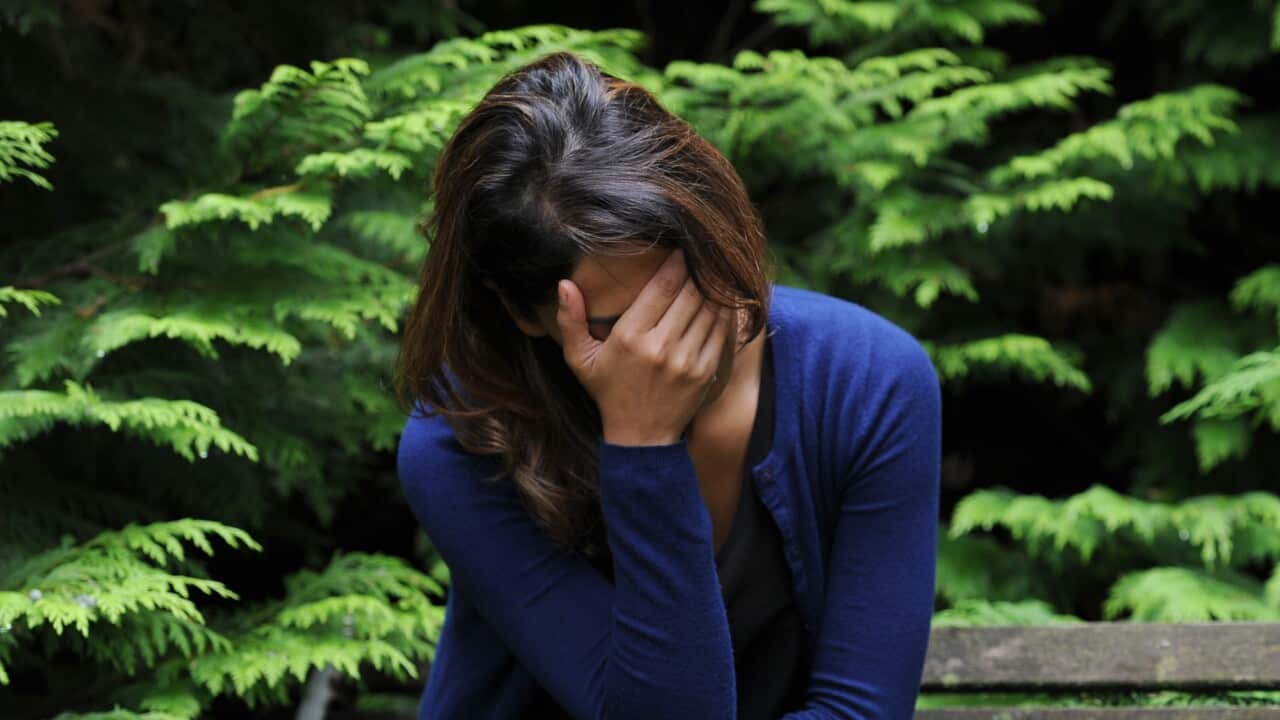In Australia's population of 27 million people, approximately 8.5 million will experience a mental illness at some point in their lifetime.
Many more may go undiagnosed, but will experience bouts of loneliness, low moods, and feelings of stress or anxiety.
The number of people accessing mental health services is increasing, and despite more widespread conversations about mental health, experts say change is needed.
This is a snapshot of mental health in Australia.
How common are mental health issues in Australia?
According to the conducted by the Australian Bureau of Statistics (ABS), an estimated 43 per cent of the population has experienced mental illness.
21.5 per cent had had symptoms of a mental illness in the 12 months leading up to the survey.

Many Australians will experience a mental illness or mental health issue in their lifetime. Source: SBS News
Since around 2013, there has been a consistent upward trend in the proportion of Australians experiencing psychological distress, and in 2021, 28.9 per cent of females and 22.7 per cent of males were in distress.
An estimated 19 per cent of Australians reported being diagnosed with depression, anxiety or any other serious mental illness at some time in their life, an increase from 11 per cent in 2009.
Samuel Harvey, executive director at the Black Dog Institute, said mental health in Australia has become worse over the past decade.
"We've got a situation now where mental illness is the number one reason people are visiting GPs across Australia and suicide is the number one cause of death amongst young Australians," he said.
"We know it's getting worse, but we don't know why."
What are the most common mental health issues in Australia?
In the most recent ABS dataset, released in 2023, anxiety disorders (such as generalised anxiety disorder, panic disorder, obsessive-compulsive disorder and agoraphobia) were the most prevalent mental health issues.
Affective disorders refer to conditions such as depression or bipolar that disturb a person’s mood to the point where it becomes difficult to function in relationships or at work.
According to the latest data, 7.5 per cent of Australians had an affective disorder in the past 12 months, and these disorders appear to be more common in females than males.
Males were more likely to have a substance use disorder, which involves the harmful use or dependence on alcohol or drugs. According to the data, 3.3 per cent of Australians experienced this type of disorder in the past 12 months.
Are mental health issues rising in young people?
The rates of mental health challenges are particularly concerning among young people, particularly women.
In 2021, double the proportion of females aged 20–29 reported that a doctor or nurse had told them that they had a mental illness compared to males the same age, according to ABS data.
The ABS also found that at the time of the survey, 38.8 per cent of people aged 16 to 24 years had had a mental disorder in the past 12 months.

The number of women aged 18 to 24 accessing mental health support services had the highest increase. Source: SBS News
Richard Morris, a senior research fellow at the University of Sydney School of Medicine, told SBS News mental health typically declines and rises at certain stages of life.
He said data has indicated that young people today appear to be struggling more compared with previous generations.
"The younger generations, the more recent generations, their mental health has been declining faster," he said.
"And we are not sure that it's going to recover in the same way that older generations mental health has recovered."
Harvey said while it's clear that increasing numbers of young people are struggling with mental health, the reason is not clear.
"We suspect that social media is part of the problem that's been driving increased rates of depression and anxiety amongst young people; we also think that the disturbed pattern of sleep that comes with the way in which young people use devices is part of it."
He suspects a number of factors are contributing to declining youth mental health.
"It's also some of the broader things going on in society around just how challenging it is for young people now to get a house, to get a stable job," he said.
"All of those things have become much harder and at the same time, people are at times more isolated, more lonely than ever."
'We need action, not just talk'
Harvey said more action is needed to improve access to mental health support services, with long waiting lists and high costs preventing some people from getting the treatment they need.
"We need action, not just talk about mental health, we need more investment in the mental healthcare system in Australia," he said.
"We need more mental heath professionals to deal with the problem that's out there, not more talk about mental health."
10 October is World Mental Health Day.
Readers seeking crisis support can contact Lifeline on 13 11 14, the Suicide Call Back Service on 1300 659 467 and Kids Helpline on 1800 55 1800 (for young people aged up to 25).
Readers seeking support with mental health can contact Beyond Blue on 1300 22 4636. More information is available at .
supports people from culturally and linguistically diverse backgrounds.













